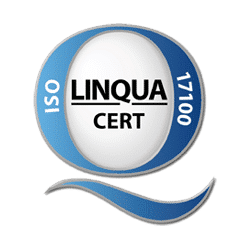
Increase your success as a translation service provider with ISO 17100 certification
There are international quality standards for service enterprises that offer translations. The ISO 17100 specifies these, among other things, and you can opt to become certified in accordance with ISO 17100 standards. As a recognized certification authority, we will help you better your chances in the examination process and raise your profile above the crowd. After all, the competition among translation agencies is fierce. The number of providers is constantly growing and with it the pressure on their endeavor. To best position yourself, you need to clearly convey the quality of your own service.

Confirmation of the quality of your translations
Clients are no longer satisfied with ratings and recommendations. With a certification of DIN ISO 17100 standards, you can guarantee your clients the highest level of work, as examined by an impartial third party. We accompany you throughout the certification process. Arrange a non-binding consultation today.
What is the ISO 17100 standard?
The ISO 17100 standard is a quality standard valid worldwide for translation service providers (or LSPs, Language Service Providers). It is meant to guarantee high-quality translations based on clearly formulated and transparent guidelines. These specifications replaced the previous DIN EN 15038, which was only used in European countries, in 2015, with international regulations. The result is a new certificate valid and recognized the globe over.
The ISO 17100 specifies in detail the requirements a translation service provider must fulfill and which processes and procedures must be adhered to. It consists of several sections:
- Resources (translators, editors/proofreaders, project managers, and subcontractors as well as the technological infrastructure),
- Pre-production (the processing of requests and offers, project preparation and specification),
- Production (translation, editing/technical editing/proofreading, and release) and
- Post-production (client feedback and finishing administrative processes).
The ISO 17100 certification of translation service providers is all about the target/actual comparison. The internal procedures, from the first client contact to the delivery of the final bill, must be structured and standardized. The second stage, then, examines whether these rules are adhered to.

What is examined with an ISO 17100 certification?
During an audit for the DIN ISO 17100, together we will look at the existing processes and procedures of your translations.
The following areas are audited in detail during certification:
- Maintenance and updating of the required competencies –
How do you ensure that the internal procedures and quality standards are adhered to? How are changes introduced and implemented? - Analysis and handling of requests – When a request comes in, it needs a formalized treatment process. With certification you must convey how requests are handled, how offers are created, and what process is used for the finalization of contracts.
- Language specifications – How are specifications documented in your company and communicated to the translator? This is an important element in consistent quality control and improvement.
- Project review – During a translation project, not only must specifications be documented, but they must also be utilized. For this you need an audit on the level of the project.
- Bookkeeping and payment processes – The finances of a project must be in accordance with customary international regulations and legal stipulations. During certification, processes of payment and billing stands at the center of interest.
- Archiving and compliance with all legal and contractual obligations – In this day and age we expect a translation agency to be knowledgeable about legal stipulations. This includes archiving correctly and consistently checking that the stipulations are being adhered to. For certification, your relevant internal processes are therefore documented.
- Client satisfaction and corrective measures – The ISO 17100 is meant to give your clients more transparency when it comes to the quality of your service. An important process here is customer service, feedback, and quality improvement.
- Data security – In this section of the ISO 17100 certification we consider how you handle sensitive information. We will inquire how you analyze and evaluate risks, what action plans you have in place, and how data is secured in your company.

What advantages does certification give LSPs?
There are three immediate advantages for you as a translator:
- You can demonstrate your quality standards for your clients.
- You have a jump on the competition.
- You will optimize your internal procedures and become more efficient.
The internationalization of the normative guidelines enables you to proffer clients the world over your ISO 17100. As a certified translation service provider you will be in the position to prove the quality of your work with objective standards. That creates trust in your services. Decision-makers will have a better basis for choosing you as a translation service provider.
In today’s competitive market, you can use the certification seal in all of your advertising and marketing efforts. This gives you a jump on the competition who has not opted to invest in certification. In the open job market you can convincingly convey your adherence to audited standards.
Since, during the certification process, the processes and procedures of your company are analyzed and optimized, you will automatically improve quality and efficiency.
You will cut costs, implement your resources better, and position yourself to consistently deliver high-quality translations.
Sie erreichen uns telefonisch unter +41 44 552 66 19 oder schreiben Sie eine E-Mail an Herrn Markus Kukla, Leiter der Zertifizierungsstelle. Wir freuen uns auf Ihre geschätzte Kontaktaufnahme!
What is the actual content of the DIN EN ISO 17100 certificate?
If you successfully complete the certification process, it will be officially confirmed with a corresponding document.
This contains:
- The specialist area of the service (such as medical translations or industry handbooks)
- The certification standard (ISO 17100:2015)
- The number of the audit report
- The period of validity
- The certification logo with ISO-standard number and
- The QR code of the digital copy of the certificate.
You may use the logo within the period of validity (six years) in your advertising materials, such as brochures and on your website. In addition, you will be listed publicly on our website as a certified translation service provider.

How we can help you
We are the recognized Swiss certification authority for language service providers. In our collaboration with them, our employees contribute years-long experience with the ISO 17100:2015 and other specifications. The audits we create correspond to international and Swiss guidelines. Working with seasoned certification partners, we can also offer you combined certification – such as the ISO 9001 or customer satisfaction.
With a certification of ISO 17100 you can
- Create trust with your clients
- Demonstrate the highest quality standards
- Improve your chances on the open job marketing
- Show professionalism in comparison to large companies and other contractors and
- Improve internal procedures, processes, and performance.
Don’t wait until your competition has been certified – jumpstart certification today. We will happily advise you about which requirements must be fulfilled and how the audit will proceed in detail.
Reach us by phone at +41 44 552 66 19 or send an email to Markus Kukla, Head Certification Authority. We’re looking forward to your valued cooperation!
Brief notes about the DIN EN ISO 17100
The standard of the DIN EN ISO 17100 (known simply as the ISO 17100) is a globally recognized standard for the certification of language service providers (LSPs) and guarantee for a high-quality translation. As an extension consistent with DIN EN 15038, which was commonly used across Europe until 2015, the DIN EN ISO 17100 is the recognized international ISO standard for certification.
The acronym ISO refers to the International Organization for Standardization, which compiles international standards. The abbreviation EN is assigned to a standard after it has been recognized by the European Committee for Standardization. If an EN is adopted into the national body of rules by a national standards institute, it also carries that designation (DIN = German Institute for Standardization).

Is there a certification for machine translation (MT)?
Aspects of machine translation (MT) and machine-translation post-editing (MTPE) are included in the standard DIN EN ISO 18587, which works hand-in-hand with the ISO 17100 and can be certified at the same time.
Where do I find more in-depth information about the DIN EN ISO 9001 and DIN EN ISO 17100?
In contrast the DIN EN ISO 9001, the ISO 17100 does not make claims to map a comprehensive management system. You will find a comparison of the coverage areas of the DIN EN ISO 9001 and DIN EN ISO 17100 in our ebook “Systematic ISO 17100 translation.”
Since its introduction in 2015, ISO 17100 has made translation service providers comparable worldwide.
The standard defines the requirements for resources as well as pre-production, production and post-production processes. At the same time, it defines the skills of translators, editors and project managers in addition to the use of translation tools. The purpose of ISO 17100 is to ensure continuously high translation quality by means of stable and standardised processes.
Sie erreichen uns telefonisch unter +41 44 552 66 19 oder schreiben Sie eine E-Mail an Herrn Markus Kukla, Leiter der Zertifizierungsstelle. Wir freuen uns auf Ihre geschätzte Kontaktaufnahme!
Your advantages as a user of ISO 17100:
- Clear positioning among your competitors as a top translation provider
- Increased efficiency and reduction of subsequent processing through standardisation
- Customer retention and access to tenders according to ISO 17100
Advantages for your customers:
- Able to rely on your adherence to the terminology and project specifications
- Reduced cost in LQA sampling procedures
- Simplified selection of suppliers through proof of the ISO 17100 certification
Since 2007, LinquaCert has boasted in-depth experience and audit competence in the translation industry. Thanks to our partner network, we can offer certification according to ISO 9001 under DAkkS accreditation in combination with ISO 17100.
